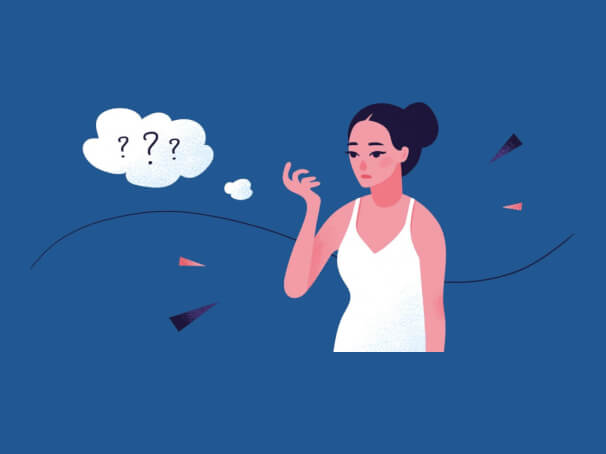
Anxiety is not just an emotional issue. It causes physical symptoms that can disrupt your ability to live a high-quality life. Treating anxiety is not just about controlling your stress but also about managing how your mind and body are affected by the symptoms.
Nausea is a common anxiety symptom. It involves an uncomfortable feeling of sickness in the stomach that gives you the sense you might vomit. Nausea due to anxiety can be a considerable barrier to your ability to deal with your hectic schedule. Like other symptoms of anxiety, nausea can be unpredictable and can affect your ability to perform at your best at home, at work, at school, and in your relationships with your friends and family.
Can Anxiety Cause Nausea?
Many different things can lead to nausea. We don’t know exactly why this happens, but it appears to be a bodily response to something that irritates or disrupts the natural state. Did you eat too much? Nausea. Did you get an illness? Nausea. Have you spun around in a circle? Nausea. You didn’t get enough sleep? Nausea. Did you run too fast? Nausea. Certain illnesses are associated with nausea, and it also often accompanies feelings of disgust.
The evolutionary purpose of nausea is thought to be to notify a person of something and prevent the person from repeating whatever they just did. Although unexplained nausea is possible, nausea is generally your body’s way of telling you that it doesn’t like something that occurred or the results of that action.
Nausea is triggered by internal signals. These signals can come from all over the body — from the cerebral cortex to the chemoreceptor trigger zone to the peripheral and vestibular systems. The messages travel toward the brain stem, where they trigger a series of actions that ultimately lead to feelings of nausea and the movement of the contents of the stomach up the digestive tract.
It should come as little surprise that anxiety can also cause nausea. Its intensity is largely related to the causes and types of anxiety you’re experiencing. Not everyone will experience nausea, but those who do may have mild to severe nausea.
We’ve all seen those movie scenes where the main character experiences something truly frightening and their reaction to that fear is throwing up. They experience a shooting or barely survive a traumatic event, and the first thing they experience is nausea — nausea that may even lead to vomiting. Their fear is so pronounced that something is triggered in the body, making them feel sick.
Nausea is one of the most common anxiety symptoms. But why does it happen, and what can you do about it?
What Causes Nausea Due to Anxiety?
Anxiety-related nausea arises due to a variety of different issues.
In most people with anxiety, stress causes nausea. In others, the anxiety itself can lead to the development of nausea separately from the stress response.
A Natural Part of the Fight-or-Flight Response
Anxiety is a natural reaction, and in small doses, it’s actually healthy. It is thought that some of the symptoms of anxiety — including nausea — developed to tell your brain that there was something dangerous or new in the vicinity so that you would make a smart decision regarding your next action.
When you are under stress but not facing any present danger, nausea can be especially distressing. When faced with stress, the body goes into the "fight or flight mode," triggering the autonomic nervous system — specifically activating the sympathetic nervous system and inhibiting the parasympathetic nervous system.
这一行动释放一种叫做肾上腺素的激素,which is often referred to as "adrenaline." Additional stress may trigger other adrenal-related hormones. These hormones alter the stomach lining and food digestion; take blood away from the digestive system; and cause hyperventilation (which over-oxygenates the bloodstream), dizziness, and more.
Stress can also cause muscle tension in your abdomen, and that added tension may squeeze your stomach in a way that leads to nausea. The gut also has an abundance of neurotransmitter receptors and is highly connected to the brain. It is possible that the way anxiety alters neurotransmitter levels in the brain may affect the gut as well.
最后,在“战或逃”,消化hibited, which may affect how you process food and stomach acid and may lead to nausea.
How Anxiety Causes Nausea
Stress and anxiety are often linked as the latter can be caused by stress and can create it. But there are also ways in which anxiety can lead to nausea independently of stress. They include the following:
- Anxiety can make someone "hypersensitive" to the way their body feels. This means they give more attention to the body. When you become hypersensitive, a small amount of "normal" nausea that you otherwise could ignore can feel like severe nausea that is difficult to control.
- Anxiety是a known trigger of and contributor to是sues like motion sickness, so some people with anxiety tend to have worse nausea during car rides and similar movement.
- Anxiety may change the body’s levels of neurotransmitters like serotonin. Serotonin also plays a role in the reactions of the gut. Thus, it is possible for changes in these neurotransmitters’ levels in the brain to trigger nausea signals in the gut.
Of course, anxiety itself also causes and is caused by stress, so all of the stress responses are similar to the responses of those that have frequent or chronic anxiety.
How to Cure Nausea Due to Anxiety
In the case of nausea due to anxiety, the nausea itself isn’t dangerous. As long as you have ruled out other health problems and your doctor or therapist has confirmed that anxiety is causing your nausea, it is helpful to know that your body is not in any serious danger. Instead, to control your nausea, you need to manage your anxiety. Chances are your body is experiencing a great deal of stress related to persistent anxiety.
Several strategies for fighting anxiety include the following:
- Jogging- jogging is a powerful tool for fighting anxiety. It tires your muscles, which reduces the amount of tension they put on your stomach. It also releases endorphins, "feel good" hormones that improve your mood. In addition, it regulates hormones anddepletes adrenaline, which can help control anxiety.
- Deep Breathing- deep breathing is one of several stress-reduction techniques that are effective for controlling the response to stress. Deep breathing involves taking slow, controlled breaths in order to get your heart and mind under control. One method entails sitting in a chair and breathing in slowly through your nose for 5 seconds (aiming to breathe into your belly), holding your breath for 4 seconds, and then breathing out through pursed lips slowly (7 seconds is ideal). You should repeat this 10 times. Other relaxation techniques include progressive muscle relaxation and visualization.
- 光和健康饮食- your nutrition doesn’t necessarily affect your anxiety nausea. But it can affect the severity of your nausea. Heavy, fattening, unhealthy meals tend to lead to more nausea than healthy meals.
- Drink Water- like healthy eating, water can help keep your body nourished as it has no ingredients that would exacerbate your upset stomach. In addition, it’s not uncommon for dehydration to lead to more anxiety, so drinking water can actually be a form of anxiety treatment. Just make sure you don’t drink too much water too fast or you may get some mild nausea.
- OTC Medicines- Tums, peppermint, and Pepto-Bismol may also provide temporary relief from anxiety-related nausea. They can be used for nausea that occurs on rare occasions but should not be used by those who experience regular, persistent nausea due to anxiety.
These are all quick strategies for reducing anxiety nausea. However, fighting anxiety is a long-term issue. If you experience a great deal of anxiety at home, at work, at school, or in social situations, then you need to learn effective ways of controlling it. Once your anxiety is managed, the likelihood of nausea will decrease.
SUMMARY:
Nausea can be caused by multiple issues that may or may not be related to anxiety, including changes in neurotransmitter levels, stress to the gut, blurry eyes, and more. Anxiety can also make a person more sensitive to feelings of nausea, so mild nausea feels more intense. Walking, drinking water, and light eating can be helpful, but anxiety reduction will be the only way to stop anxiety-related nausea.










